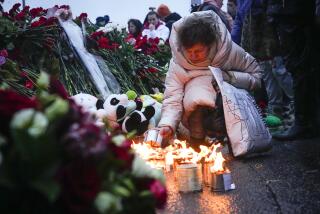Cholera Prompts Russia to Force 156 Off Train
- Share via
MOSCOW — Russian authorities apparently won’t let anything stand in the way of Moscow’s upcoming 850th anniversary celebration--certainly not a case of cholera.
And so all 156 seemingly healthy passengers who had been bound for the capital on two railroad cars from Uzbekistan were under armed guard Saturday, held in quarantine against their will in a small-town hospital outside Moscow.
Health officials said the group--including 21 children--was exposed to cholera on the Tashkent-Moscow train by a sick passenger who then got off in distant Kazakhstan two days and 1,500 miles earlier.
It wasn’t until the travelers from the Uzbek capital were 40 miles from Moscow that authorities stopped the train and unhooked the two cars in which the ailing man had ridden. In the middle of the night, the passengers were forced at gunpoint to leave the train and were locked in a rundown hospital that doesn’t even have hot running water.
“In a different situation, we might have acted more casually and quietly,” said Victor M. Tkachev, a health official with the Railroad Ministry. “But we can’t allow the celebration to be marred in such a horrid way. To save Moscow from imminent panic on the eve of such an important event, we decided to stop the train at a small station not far from Moscow and carefully isolate the passengers.”
As of late Saturday, none of the 156 passengers had shown any signs of cholera since they were detained in the town of Lesnoye in the early hours of Friday morning.
Inside the hospital where they were crowded together, the quarantined passengers angrily protested their treatment. Several of them broke hospital windows while the cameras of television station NTV were rolling.
“The police arrived [at the train] and said if we didn’t go voluntarily, ‘we will beat you up,’ ” recounted one passenger. “Some didn’t want to leave. They barricaded themselves in, and the police had to storm the compartment.”
One woman who refused to leave the train said she was beaten by police; she showed television viewers a black eye that she said proved it.
“We were taken out of the train in the dead of night under the barrels of submachine guns,” said another woman, who was holding a small child.
Cholera is a highly contagious intestinal disease that is transmitted by water or by food contaminated with the feces of those carrying the disease. The bacterial disorder causes severe diarrhea and dehydration and can be fatal if untreated. Promptly treated with intravenous solutions, it lasts only a few days.
Health officials said the passengers’ blood was being tested every 12 hours and that the group could be released as early as tonight--if no one shows signs of the disease.
“If we get even a single positive sample result, we will have to keep them all some more time,” Tkachev said. “I am sorry some of them are so angry, but this is the internationally approved practice of dealing with possible epidemics.”
The train originated in Uzbekistan, where more than 1,000 cases of cholera have been reported recently. The sick passenger, who was stricken with diarrhea on the train, got off in southern Kazakhstan, a few hours into the 63-hour train ride, and was hospitalized.
Health authorities in Kazakhstan said they reported the case immediately, although officials in Moscow said they did not receive word for some time. Passengers said no one was allowed to leave the two cars at subsequent stops--but that new passengers were permitted to board the cars.
To some people, the detention of the passengers smacked of the old autocratic Soviet way of doing things. But Tkachev said the breakup of the Soviet Union into 15 countries has made it harder to handle such health crises.
“This time, the bad news broke in Kazakhstan, which is no longer part of the former Soviet Union, and the communication is not so swift anymore,” he said. “That is the only reason I can see to explain such a critical delay.”
Other officials defended the heavy-handed quarantine, arguing that the risk to Moscow was far greater than the inconvenience to the small number of passengers.
“All measures that are taken are totally justified,” said Nikolai N. Shelemenkov, duty officer at the Emergency Situations Ministry. “What rights are you talking about if the health of millions of people can be at stake?”
Some observers speculated that the decision to prevent the two railroad cars from entering the city originated at Moscow City Hall.
The upcoming anniversary bash is widely regarded as the kickoff of the presidential campaign of Mayor Yuri M. Luzhkov, who has presided over the capital’s rejuvenation.
The planning for next weekend’s celebration has been underway for 18 months, and more than $60 million has been spent to give the city a face lift and prepare for the party.
Numerous dignitaries--possibly including Vice President Al Gore--are expected to arrive from all over the world. One of the highlights will be a performance by operatic tenor Luciano Pavarotti in Red Square that is expected to draw 1 million people.
As the passengers from Uzbekistan waited out their quarantine, the railroad cars they had ridden in were being disinfected and returned to duty. By Saturday, the cars were already hooked up and on their way back to Tashkent on the train’s return run.
Sergei L. Loiko of The Times’ Moscow Bureau contributed to this report.
More to Read
Sign up for Essential California
The most important California stories and recommendations in your inbox every morning.
You may occasionally receive promotional content from the Los Angeles Times.













